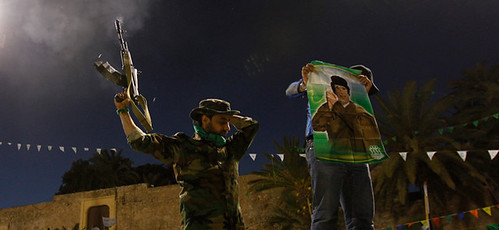
Libyan patriots defend the state against the onslaught by U.S. imperialism and its agents who have embarked upon a massive bombing campaign targeting this North African state. Imperialists met in London to plot regime-change., a photo by Pan-African News Wire File Photos on Flickr.
Gaddafi troops force rebels to retreat
Pro-Gaddafi forces retake Bin Jawad, as opposition fighters retreat in the face of renewed counter-offensive
Last Modified: 29 Mar 2011 23:38
Troops loyal to Muammar Gaddafi, the Libyan leader, have shelled pro-democracy forces heading west on the main coastal highway, pushing them out of Bin Jawad, a small town around 150km east of Sirte, Gaddafi's hometown.
Al Jazeera's Hoda-Abdel Hamid, on the road leading east from Ras Lanuf, reported that explosions had also occured in that town on Tuesday, which opposition fighters had earlier retreated to from Bin Jawad.
"So certainly what we can say at this stage is that Bin Jawad is not any more in the hands of the rebels, actually the Gaddafi forces now are managing to pound Ras Lanuf and are getting closer and closer to them, pushing the opposition fighters eastwards more and more," she said.
"I think this is an exact repeat of what happened about three weeks ago."
Pro-Gaddafi forces were mostly using mortars and artillery, as opposed to the tanks and airstrikes of early advances, she said
"The Gaddafi guys hit us with Grads [rockets] and they came round our flanks," Ashraf Mohammed, a 28-year-old fighter wearing a bandolier of bullets, told a reporter from the Reuters news agency at the front.
Also on Tuesday, several explosions were heard in the capital, Tripoli, but it was unclear as to where exactly they occured.
The Pentagon said that international forces had launched 22 Tomahawk cruise missiles and flew 115 strike sorties over Libya in the last 24 hours.
The reversal for Libya's nascent opposition came after their forces had made a speedy, two-day advance from Ajdabiya.
Ajdabiya is a crossroads town that Gaddafi's troops had held for two weeks before an international military intervention allowed pro-democracy fighters to take it back.
On Monday, the pro-democracy forces moved as far west as Nawfaliya, another small town around 20 kilometres past Bin Jawad, before making a hasty evening retreat in the face of artillery fire from Gaddafi's troops.
A spokesman in the eastern opposition stronghold of Benghazi had announced earlier that day that Sirte itself had fallen, a rumour that turned out to be untrue.
The rebel retreat from Bin Jawad came as representatives from more than 40 countries gathered in London for a conference discussing a post-Gaddafi political future for Libya.
Humanitarian situation
As diplomats met to discuss a Libya without Gaddafi, the man who has ruled the country for more than 41 years still seemed capable of holding onto power.
Most of the rebel forces in Bin Jawad were forced to flee on Tuesday under a barrage from Gaddafi's forces that included mortars and possibly rockets, Al Jazeera's James Bays reported from the town.
Opposition fighters in the western town of Misurata also said they came under renewed attack from pro-Gaddafi forces, with eight civilians killed, according to a spokesman.
An opposition spokesman in the city described the humanitarian situation there as "catastrophic", saying that water and electricity had been cut off and residents were running short of essential supplies, including medicines.
The main body of opposition fighters is still composed mostly of young and untrained men who are not used to carrying weapons or fighting in a war and do not take simple precautions to protect themselves, like digging defences in the ground, our correspondent said.
"The plan seems to be for most of these youngsters to drive along the road and see how far they could get," he said.
"Another weakness of this mainly volunteer army ... [is that] they really haven't protected their flanks. Basic military rules if you were dealing with a regular army are not being followed."
Obama justifies intervention
Hours before the rebel retreat from Bin Jawad, Barack Obama, the US president, defended his country's involvement in the military campaign in Libya in a televised address to the nation.
Speaking to military officers and reporters at the National Defence University in Washington on Monday night, Obama said he refused to wait for images of the slaughter of civilians before taking action.
Obama said the Western-led air campaign had stopped Gaddafi's advances and halted a slaughter that could have shaken the stability of an entire region and "stained the conscience of the entire world".
"Some nations may be able to turn a blind eye to atrocities in other countries," he said. "The United States of America is different."
But he said that broadening the international mission to include regime change would be a mistake.
"If we tried to overthrow Gaddafi by force, our coalition would splinter," he said.
The US took the initial lead in the Western-led military action against Gaddafi before the recent NATO decision to take over the operations. Obama said the United States will transfer control to NATO on Wednesday.
Obama said once that transfer occurs, the risk and cost to US taxpayers will be reduced significantly.
Al Jazeera's Patty Culhane, reporting from Washington, said Obama's speech had two striking contradictions.
"The president said we must stand alongside those who work for freedom and at the same time he said we cannot be the policeman of the world only when it applies to our national interest," Culhane said.
"The president [seems to] be trying to explain why we have seen a lesser response to allies like Bahrain or Yemen."
Obama did not discuss plans for disengagement.
Source: Al Jazeera and agencies
1 comment:
'Troops loyal to Muammar Gaddafi, the Libyan leader, have shelled pro-democracy forces'
pro democracy forces?! not likely..but you have to love the bias in this eg of 'journalism'. Its not as it its trying to lead the public
Post a Comment